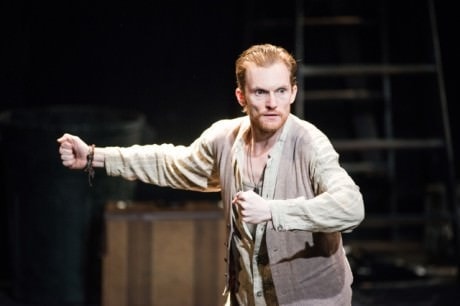Bravura Performance at The Studio Theatre
Early in Lisa Peterson and Denis O’Hare’s An Iliad, the Minstrel/Poet says he hopes he never has to tell this story again, meaning, I suppose, he hopes audiences will finally outgrow battle lust and let him do some new material like “Song of Myself” or “Paradise Lost.” Later I think he hopes we’ll outgrow war itself, and thus release him from the fate of bearing witness through the ages. And by the end of the play I’m pretty sure the story harms him, diminishes him, takes another little piece of his heart every time. How much heart can he have left?
Scott Parkinson, who plays the Minstrel/Poet in The Studio Theater’s production of An Iliad, has a long jaw that looks hollow underneath, like an empty bowl. He shuffles onto the stage in a flimsy overcoat and tattered trousers, lugging an old suitcase and squinting into the distance, his eyes rimmed in red, as if trying to see where to go next. Then he glimpses the audience and realizes that this is in fact the next stop on his tour, even though it’s a basement. So it’s come to this — Talk about a dive! Bare bulbs in metal cages, cords in crates, step ladders, an industrial wash basin. The effective set designed by Luciana Stecconi looks like an under-theater where they store the stuff that no one really needs. The kind of place where you might watch a cock fight or a crap game.

Resigned, he sets his suitcase down and utters the opening verses of The Iliad, in Greek, which ask the goddess to sing the rage of Achilles, “murderous, doomed, that cost the Achaeans countless losses, hurling down to the house of death so many sturdy souls.”
“Back then I could sing it,” he says, “verse after verse, name after name.” He no longer remembers the names of all those sturdy souls, and that troubles him, but he remembers the great performances, the houses he brought down, the crowds who loved to hear him sing. They loved him in Gaul, he remembers — those barbarians! Rolling out of the tavern to plunder and pillage the night. It was easier to tell this story in a tavern, or an amphitheater, but it’s come to this.
That’s the story this play tells: it’s come to this: how much lower does it have to go? Or at least that’s one of the stories.
It’s also the story of the Trojan war, the clash of Hector and Achilles, and the rages most of us restrain. That’s the first word in Homer’s text: Rage. Why every generation wants to hear that story is one of the mysteries underlying the play, and the poem.
They’ve been at it for nine years, Parkinson explains, for reasons no one remembers. Nine years — imagine! You go hame and your father’s dead. You go home and your wife is fat. You might as well just stay. Here, at least, you get the smell of blood and bronze, the illusion of honor, the thrill of hacking someone’s body into pieces, which beats the hell out of making sandals or waiting tables.
“Muses, don’t make me do this alone,” Parkinson says, and cellist Rebecca Landell joins him onstage. Costume Designer Laree Lentz has dressed her in a creamy gown and wrapped her tawny braid of hair around her head. She looks like a figure on a Grecian urn, her instrument between her legs, her white arms floating in the basement darkness. She collaborates with Parkinson, watching him, prompting him, elaborating on his anecdotes and coloring his thoughts with music. She doesn’t speak. Neither does Lighting Designer Colin Bills, who must be watching from a hidden booth, cuing on Parkinson, responding to the flicker of his moods and helping him remember what to say. Director David Muse gets the light, the music, and the actor to function as a story-telling team.
The play’s rising action peaks when Parkinson describes the death of Patroclus, who was Achilles’ brother-in-arms. The scene begins in summary, Parkinson explaining how Patroclus came to be wearing the armor of Achilles, but then suddenly he grabs a push broom, kicks it’s head off, and turns into Hector, wielding the handle of the broom like the shaft of a spear, with which he skewers the already injured Patroclus. “Now with a close thrust Hector son of Priam tore the life from the fighting son of Menoetius, who had killed so many men, and gloried over him wild winging words.” Parkinson leaps onto a table, shakes the spear, throws his head back, and Bills throws while light at him from behind, the light of rage, which erases the features of his face to such a degree that he could be any body.
When the thrill of that ejaculation passes, he climbs off the table, visibly diminished, and says, “That’s why I can’t do this anymore. I’m sorry. Hector was an honorable man, but in that moment — that’s how it happens: some trick in the blood and then rage.”
That moment of fury and others like it are counterpointed by a litany that starts as Parkinson begins to tell another anecdote but then stops himself. No that wasn’t this war, he remembers, that was the Pelopennesian War, or the fall of Sumer, or the sack of Alexandria. Or was it… War after war, name after name, nothing else for six or seven minutes but the names of wars, the last of which, “Syria?” comes out as a whispered question. After a moment of silence, he becomes Hecuba, Hector’s mother, who climbs to the top of the city wall and wails in Greek for her son. Or in Coptic or in Arabic, or Latin or Russian or Korean or Quechua or Cherokee — whatever language she may speak, we each hear our own tongue.
Parkinson falls apart in the end. When he imagines telling us how Achilles died, he sits down on his suitcase and he starts to cry. He can’t do it. He shouldn’t have to do it. Why is he doomed to keep doing it? Then he pulls himself together, washes his face, and says that he’ll just tell us how the Trojans buried Hector, how they used those eleven days Achilles gave them for the celebration of their hero’s glory, and the language catches hold of him again, and takes him where he doesn’t want to go, and when he realizes that he’s shouting, he’s exalted, he’s enraged, he stops, and looks at us, and says, “You see?”
Scott Parkinson delivers a bravura performance. You must take this journey. An Iliad is not to be missed!
Running Time: 90 minutes, with no intermission.
An Iliad plays through January 13, 2013 at The Studio Theatre – 1501 14th Street, NW in Washington, DC. For tickets, call the box office at (202) 332-3300, or purchase them online.





